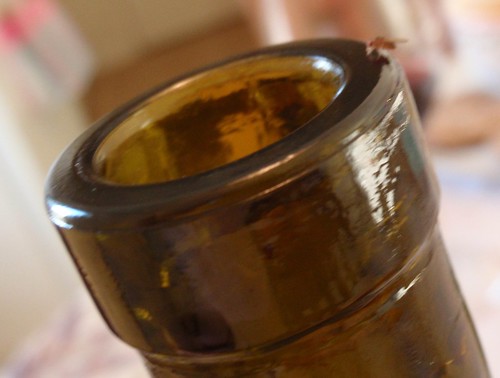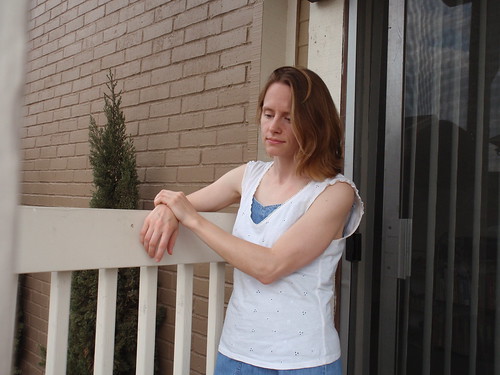Now seems like a great time to give you an update on my life in the lab. Three words sum up what I am doing: reading and writing. I am, with my advisor, writing a grant proposal to be submitted in February, but before I talk about that, I thought I could give you a little insight into how, exactly, academic scientists get money to fund their research. Because you know, those flies—they ain’t payin’ for their own food. Or wine. I present to you Figure 1:
“Merlot? I love Merlot!”
The short answer about who pays for my research is this: you do. If you live in the United States and you pay federal taxes, you fund most academic science research. It’s a huge enterprise: the 2011 budget for the National Institutes of Health was 30.7 billion dollars, and one primary investigator, such as my boss, will often have a quarter or half a million dollars to spend over the course of several years on his or her research. In my opinion, by far the most important thing that research money is spent on is salary. Because even with all the fancy equipment and supplies, who is going to do the research if there’s no one in the lab? Certainly not that guy up there—he’s too busy drinking my wine.
Now, before you get all huffy and puffy about your tax dollars and reckless government spending, let me say this: science benefits immensely from government funding. Here I don’t mean scientists, though that’s true as well, but actual science. Because my research is not being funded by a drug company or someone else who wants to make a profit with the results, the work I publish is far less likely to be biased (or shall I say, bia$ed). I’m not saying that scientists who work for drug companies can’t or don’t do good work, but I think we need to be very, very skeptical of results that come from profit-driven enterprises. Academic science is a place where basic science gets done, and the primary criteria by which it is judged are novelty and quality of the science. Not whether we can make a drug based on this work. Basic science lays the groundwork for all therapeutics, whether behavioral, environmental, or yes, even pharmaceutical.
I work in basic science, which is another way of saying that the research I’m doing has never been done before. It’s groundbreaking stuff, which is one reason why I’m pretty excited about the grant I’m writing. I work with a model system, the fruit fly Drosophila melanogaster, and I’m especially interested in behavior. As serendipity would have it, I’m studying female sexual behavior in flies, and it makes for all sorts of terrible puns and analogies with human behavior. For example, much like with human females, female flies don’t like it if a male skips the courting and goes right for the copulating. Flies like to be wooed. They also need to be in the mood. If there are more interesting things to do, like exploring a new space, then sex can wait. And it seems they need to be well-fed, or so goes the hypothesis I’m testing now.
I like telling people about my work, and it turns out that while I’m okay at doing experiments and such, I’m really good at talking about science. I seem to be the rare bird in science who actually enjoys the writing—papers, grants, you name it, I want to write it. It’s funny: I could be feeling desperate for my grants to get funding right now, but instead, I’m just loving the fact that I’ve spent most of this week reading and writing. I think I’ve read more in the past week than in the past six months. I feel like I’m back in school! But it’s better than graduate school, because this time around, I kinda sorta know what I’m doing. So it’s more fun and less anxiety.
“Gosh, I really hope we get some grant money so I can spend more time in my cave at work. The sunshine out here burns my pale skin!”
So what exactly am I doing these days? Right now my advisor and I are preparing an R21 proposal, which is a two-year grant from the NIH for innovative and exploratory work. We have a really solid proposal, and I think the science is very interesting, so I’m feeling optimistic about our chances for funding. The R21 is due in February; after that, I’m planning to write and submit my paper and then submit another grant, a postdoctoral NRSA. I had a predoctoral NRSA during my final year of graduate school, and it would be terrific to get 2 or 3 years of postdoc funding in my own name. Though I am writing the R21 (in collaboration with my advisor), the grant will ultimately be submitted in his name, which is fine with me. The NRSA, on the other hand, will be submitted in my name, so as a CV item, it has a bit more prestige. The nice thing about writing proposals for these two grants is that if we are lucky enough to have both of them funded, we can keep both grants. Many, many postdoc grants do not allow a postdoc to have two grants at one time, but that won’t be a potential problem with the R21 and NRSA.
The R21 is coming along really well. I have most of the text written, and I’m starting to work on the figures for the preliminary data that we’ll include in the grant. The grant is due in about a month, so I am relieved that a draft is coming together so fast. It also means (I hope) that I’ll have an easier time balancing grant work with my experimental work because starting next week, I’m going to have a lot more animals available for experiments. Fingers crossed!
And that, my dears, is an update on Grant Watch 2012. I won’t know how well our grant did during its review for another 4-5 months, so please be patient with me. I’m sure I’ll be updating you with good or bad news, but for now, I am feeling happier with my work than I have in a while. It’s true that if neither grant gets funding, I may be hitting the job market for a new position, but if that happens, at least I can say I enjoyed the process. Not a lot of people can say that about grant writing.
(But if you don’t mind, keep your fingers, toes, and eyes crossed for me, okay? Thanks!)



8 comments:
I do have my fingers crossed for you (when I'm not using them to work on my own grant applications and other academic projects)!
I have to admit, though, that I felt a little stereotyped in this post as a female. Sometimes I have definitely preferred to skip the wooing.
I found this to be a very cool post for two reasons. First, I'm not a science-y person, but your explanation is so clear that even I get it. In fact, not only do I get it, it sounds kinda exciting.
Second, I love hearing about people who have found their "thing". You're lucky to have found yours so young. I have a few *ahem* years on you and I'm still working on it! Good for you. You have years and years and years of success ahead of you. I'll cross my fingers for you on these projects, but I'm confident you don't need it.
Raquelita, I have my fingers crossed for you too! We anxious academics must band together.
Ha, your point about the wooing is well-taken! I suppose for humans, wooing is much more flexible, whereas flies have a pretty fixed pattern of sexual behavior until one starts mutating genes. But even for humans, a woman usually requires some time to warm up for the action, no?
Hi, Laurie, and thanks for your kind comment! I do like my work now, but I'd say I'm working toward a career where my interests are more integrated into my daily activities. Most of the time, my daily task is to generate data. Like I said, I think I'm okay at doing experiments, but I'd really like to spend more time reading, writing, and talking to people about science. So I'm thinking about how to make that fantasy a reality.
I was just getting your career post all ready to go for Monday and thought I'd pop into your blog! Your career sounds so so cool!
And consider my fingers officially crossed that you get the grant :)
Thanks for the grant update and the explanation of what you do! I admire the sciences very much, and having spent some time in grants, I know what a headache all this can be. I'm so glad you enjoy it, and have all my fingers crossed!
Thank you, Amber! It was my pleasure to be part of your series.
Chrissy, I've always thought that working as a university grant person sounded very challenging! I know how tough it can be to find your way through the tangle of grant paperwork, and to do that for lots of people would be both frustrating at times but also very rewarding, assuming you enjoy helping people meet their goals. Interestingly, I really do think that writing regularly for this blog has made it easier for me to jump into the science-writing fray. I'm more comfortable with the way that the writing process works for me, so I have faith in it. Three cheers for blogging! Who says it's ONLY a distraction from our "real" work?
PS Y'all can see the fly in the first photo, right? He's on the right side, and believe it or not, he's actually DRINKING MY WINE. I can see his little proboscis extended, the proboscis being a straw-like body part that the fly uses to feed.
ha, love the fly drinking your wine :) and what a great topic, so glad you're enjoying the reading and writing! must say i'd totally rather just do the science and leave the reading to someone else... but maybe that's b/c i'm not that passionate about what i currently do...
Post a Comment